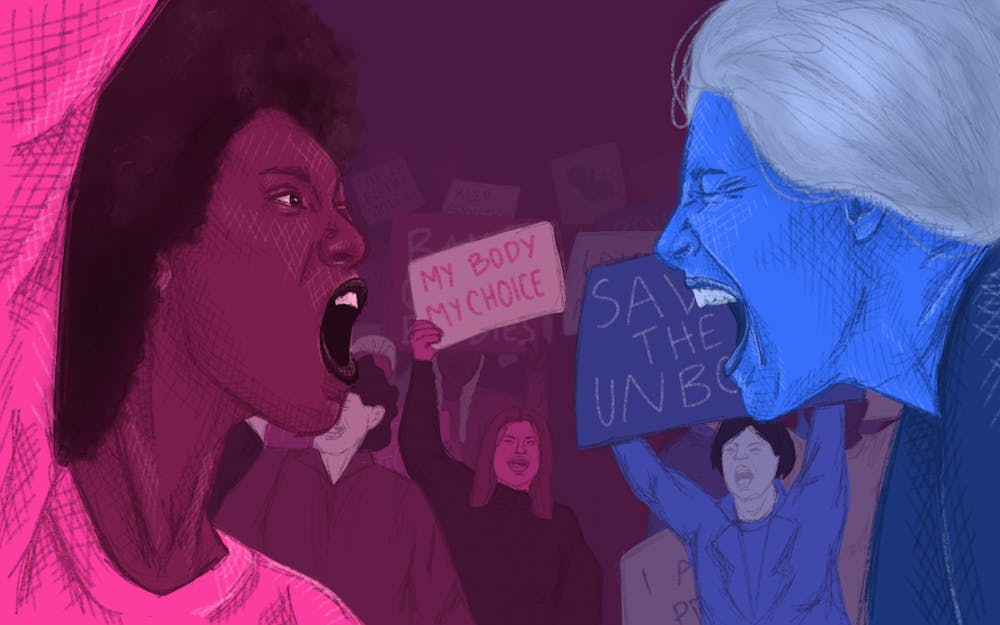As controversy over abortion rights continues, IU experts say it’s not yet clear whether Indiana will further restrict or totally ban abortion.
The Supreme Court is in favor of overturning Roe v. Wade, an initial draft majority opinion shows. The draft opinion, published by Politico May 2, is a response to Dobbs v. Jackson Women’s Health Organization, a case questioning the constitutionality of a Mississippi law that prohibits most abortions after 15 weeks of pregnancy.
The ruling would end federal protection for abortions, allowing each state to decide whether to ban abortion. Chief Justice John Roberts said the draft doesn’t represent the court’s final decision, which is expected in late June or early July.
On March 8, 100 Indiana Republican legislators signed a letter to Gov. Eric Holcomb asking him to call a special session should Roe v. Wade, the landmark 1973 decision legalizing abortion nationwide, be overturned. A special session is a meeting of the legislature outside of the normal legislative session, which ended on March 8.
“As a state that recognizes that life is a precious gift that should never be neglected, it is our desire that you, as the Governor of Indiana, ensure those values are upheld without delay,” the letter said.
The effect the law would have on Hoosiers is uncertain, since the March 8 letter doesn’t state what possible legislation might look like. But with a largely conservative legislature, many are wondering whether a ban could eventually be enacted.
In an opinion piece for the Richmond-Palladium Item, Sen. Jeff Raatz, R-Richmond, said he would “wholeheartedly support any step the General Assembly takes to protect the lives of the unborn.” Sen. Raatz declined an interview with the Indiana Daily Student.
State senators Jean Breaux, D-Indianapolis, and Shelli Yoder, D-Bloomington, released a joint statement criticizing the letter. Yoder thinks it is outrageous, she said, that the legislature is considering a special session to restrict abortion rights when the nation is facing issues such as income inequality, gun violence and child care deserts.
Gov. Holcomb released a statement saying that he would wait to act until the Supreme Court announces a final position.
Beth Cate, a clinical associate professor at the O’Neill School of Public and Environmental Affairs, has over 20 years of experience in law, including constitutional law. She said the purpose of calling a special session is likely to demonstrate the legislature’s commitment to tightening abortion restrictions or to pass laws more quickly.
13 states have “trigger laws,” which would make abortion illegal almost immediately in those states if Roe is overturned. Currently, there is no trigger law in Indiana. Cate said she guesses Indiana won’t pass one before the Dobbs decision is released in case the Court does not overturn Roe v. Wade.
Cate suspects Roe will be overturned, she said, but isn’t sure if Indiana would ban abortion altogether. She said she expects it would have to recognize an exception where the life or health of the mother was in jeopardy, although it’s not guaranteed.
“As much as the legislature is very conservative as a whole, and I think the population of the state trends conservative as well,” Cate said, ”generally speaking, there has been a consensus view that early term abortion access is good public policy.”
Laws that increasingly restrict the number of weeks during which abortion is legal or prohibit nearly or all abortions have passed across the country in recent years, such as in Texas and Oklahoma.
Similar laws in Indiana have failed to pass or have been adopted and later blocked by court challenges. Currently, abortion up is legal in Indiana up to 22 weeks.
Laura McCloskey is a professor in the School of Public Health. McCloskey said she believes a drastic change in Indiana’s abortion laws would come in the form of a ban rather than the time a person has to get an abortion. She said if Roe is overturned, she thinks there will be a move within state legislature to pass laws restricting abortion.
While the leaked opinion may foreshadow overturning Roe v. Wade nationwide, ultimately she isn’t sure what will happen within Indiana itself.
“In Indiana, we’ll have to wait and see what happens,” she said. “I don’t think it’ll happen immediately.”
However, if Indiana does ban abortion, she said, Congress could use its power to legalize abortion once again.
“It’s possible they could introduce legislation again, making abortion the law of the land,” McCloskey said. “Congress could come through in a year or two, and whatever Indiana planned could be moot.”






